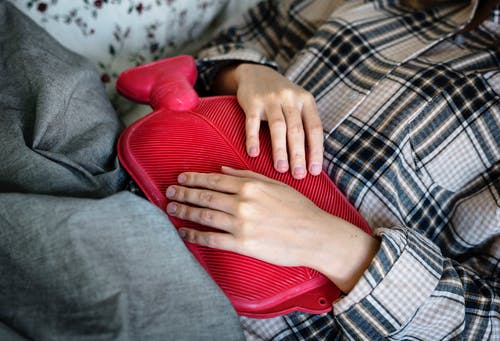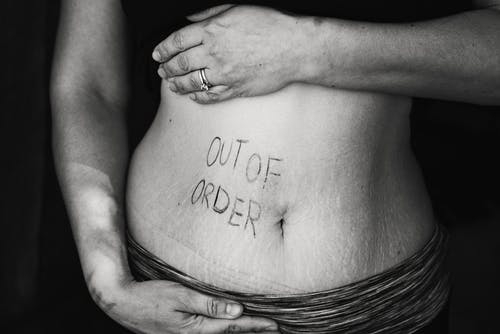Are you in recovery from anorexia and dealing with a swathe of distressing and painful digestive symptoms (bloating, constipation, fullness) which are making eating even harder? Are you searching everywhere for why and how to get some relief so you can ‘just eat’ and feeling overwhelmed by the endless recommendations and often inaccurate (however well-meaning) advice and opinions? Are you over it all and ready for a no BS understanding of what’s truly going on with your digestion and how to make a difference? Then I highly encourage you to keep reading because in this week’s post we clear up the reasons behind some of the most common digestive problems people have during recovery and how you can actually fix them.
Common Digestive Problems During Recovery from Anorexia
- Bloating
- Slow digestion
- Lack of appetite
- Early satiety
- Reflux
- Nausea and/or Vomiting
- Constipation and/or diarrhoea

Why Do I Have These Symptoms?

I have people ask all the time if any number of these symptoms means they are eating too much and need to give their digestive system a ‘break’ or if they are intolerant to certain foods (thanks to doctor Google the top concerns are lactose and gluten intolerance). Never are the first two options the case and I have to say that despite food intolerances being depicted in the media as epidemic rarely is the second the case.
So, what is going on? During the reintroduction of food (adequate, consistent and nourishing) there are a number of factors at play which severely disrupt digestive processes. The following list of 9 reasons you may be experiencing digestive problems during recovery is not exhaustive by any means, but it should clear a few things up for you as to what’s going on with your belly.
1. Decreased peristalsis (movement) of the muscles of the intestines.
This decreased movement means food travels slower through the digestive tract causing you to get full quickly and slowing digestion and absorption of food and you stay full for longer than normal after eating. For a sense of just how much the speed of digestion is reduced it can take up to 5 times longer for someone recovering from a restrictive eating disorder than for a healthy person to digest the same meal which means if a regular meal takes 1-2hrs to be digested in a healthy person the same meal may take 5-10hrs to be digested in someone recovering from anorexia.
2. Decreased secretion of digestive enzymes.
There are many digestive enzymes secreted by different organs along the digestive route and these enzymes are necessary to help breakdown the food you’ve eaten into absorbable components. During an eating disorder and during recovery from an eating disorder this secretion is severely disrupted because these organs are not functioning properly this leads to food being digested slower or sometimes passing through undigested to ferment in the large intestine and cause bloating, excess gas or diarrhoea.
3. Decreased acid concentration in your stomach.
Your stomach adapts to low food intake by decreasing the secretion of hydrochloric acid (HCl) which means your stomach doesn’t produce enough acid to digest normal amounts of food this leads to food sitting in your stomach longer than usual making you feel overfull for longer than usual after eating, may cause reflux or allow for growth of bacteria such as h. pylori which can lead to development of stomach ulcers and cancer and make eating even more painful. The reason for this is that the acidic environment of your stomach acts as an immune system defence against such pathogens and when the acidity is decreased due to damage to the cells that secrete HCl (parietal cells) this protection is compromised and therefore doesn’t do the job it is supposed to.
4. Atrophy (breakdown) of the inner surface of your intestines and/or stomach.
This happens in response to underuse and/or lack of adequate protein. When your body’s daily requirement for protein exceeds your dietary intake over a period of time because your body has had to resort to metabolising (breaking down) the muscle of your intestines to meet your protein needs (we don’t store protein and therefore when we’re not consuming adequate amounts in the diet our bodies must breakdown our muscle tissue including skeletal muscle and heart tissue but also the smooth muscle of our digestive tract)
5. Disturbances in the production of hormones which regulate appetite.
Including both ghrelin (the hunger hormone) and leptin (the satiety hormone) so that your body’s signalling and response to both hunger and satiety is messy. Essentially, your body is not going to waste its energy and resources creating hunger hormones if you don’t respond to them.
6. Suppressed thyroid functioning.
Your thyroid is responsible for producing thyroid hormone which is an important hormone in regulating metabolism. The production of thyroid hormone is greatly reduced in people living with restrictive eating disorders and this is a natural adaptive response of your body because it is trying to reduce your energy expenditure, protein breakdown and metabolic rate in order to conserve energy for the function of your vital organs and the task of keeping you alive.
7. Vitamin and mineral deficiencies.
In those with anorexia nervosa there is often generalised micronutrient deficiencies, and this interferes with proper digestion and use of foods because many vitamins and minerals are necessary along the course of the intricate metabolic pathways that occur right through from digestion to release of energy from those foods in order to be used by your body (for example the B vitamins).
8. An overactive gut-brain connection.
People with restrictive eating disorders often have a hyperactive connection between the feeling of fullness and how this is registered in the brain. Fullness (stretching of the walls of the digestive tract) is registered as an extreme cause of psychological distress in those with an eating disorder compared to a healthy person where the same signal would simply provide an indication to stop eating soon.
9. Stress.
The effect of stress on impairing digestion cannot be underestimated. People living with eating disorders often suffer a range of psychological disturbances due to low food intake including anxiety, irritability, depression and loss of interest in life and social situations which makes sharing meals excruciatingly stressful or impossible and when our bodies are under stress digestion is one of the processes which shuts down in order to provide energy and blood flow to the muscles ready to fight or flight and escape the stressor (an adaptation useful for running from tigers but not useful when your brain has misidentified food as a threat). Therefore, when your body is in a constant state of stress digestion will be very slow.
The Hard Truth

The list of reasons for digestive problems during recovery from a restrictive eating disorder goes on however, all these unpleasant symptoms come back to one common cause, starvation and malnutrition, and therefore one common cure reversion of starvation and malnutrition.
In other words, the only way to reverse these distressing symptoms is through adequate and consistent renourishment. Which means eating to your needs and as much as you think you are eating ‘enough’ by reading what to eat or comparing to what others eat until these symptoms clear up, the hard truth is you’re more than likely not.
If you are eating less to prevent or lessen these horrible symptoms you may be granting yourself temporary relief but in long term recovery there is no avoiding them because in order to recover you will have to go through it at some stage, there is no alternate path. Certainly, there are means of making renourishment during recovery less psychologically distressing however, the physical realities of it remain.
Recovery means doing the hard things, you must eat even when you are not hungry in the slightest, even when you just ate, even when you are bloated and constipated and gaseous and refluxy and nauseous. This is recovery your body needs nourishment to overcome the damage that is the reason for these horrible symptoms and one day as frustratingly cliché as it sounds it will have all been more than worth it.
How to Make it Easier on Yourself

Get great people on your team!
People who know what they’re talking about not the friend who’s on a new diet each week or those who feel it’s their place to comment on how much you’re eating, not magazines, not your workmates, not your mum, not your uncle, not TV programs or your favourite celebrity but real live professional, credible people who’ve invested years of their lives and thousands of dollars into obtaining legitimate education and training in order to provide you with useful information, tools and strategies that they can share with you to guide you as you learn to reconnect with your own power, certainty and sense of internal guidance of what’s right for you (so that one day you truly wont’ give a f*%$ about what x, y, z person posted on Instagram about bananas, breakfast or the keto diet).
There is no two ways about it, becoming free of these painful symptoms requires your body to do a monumental repair job (regardless of your weight because nutritional restoration does not finish when you reach a magic number on the scales) and this repair can only happen when you eat to a replenishment diet which means eating more than if your body had not been through this. Please make certain you have a supportive dietitian who understands, listens and respects your unique needs (not the literature, not the statistics, not a BMI criterion but you, you, you, you, YOU!) because to do this alone is unrealistic.
I know you have a good understanding of nutrition, food and health however until you are free from the eating disorder all of what you know has come through a very biased and very harmful filter and is selected and distorted to fit the psychopathology of the illness that you want and deserve to be free from therefore, this first step of recovery requires trust more than more knowledge or information. Make certain you are putting your trust in the right hands and I really have to reiterate that the right hands are not such and such model on Instagram, paleo enthusiast on YouTube or gym junkie Greg from next door because you deserve consistent and reliable support from someone who is invested in you and with nutritional matters the person qualified for that position is a great dietitian. If you’re concerned I assure you a great dietitian is not a food policeman/woman, they’re not going to force you to eat anything, they don’t have all the answers to your healing but they are going to work with you where you are and with what you are capable of and help you get to where you want to be. It is never too late to break free and become the person you were meant to be.
With my whole heart I hope you found this information useful and inspiring;

Become Great. Live Great.
Bonnie.

